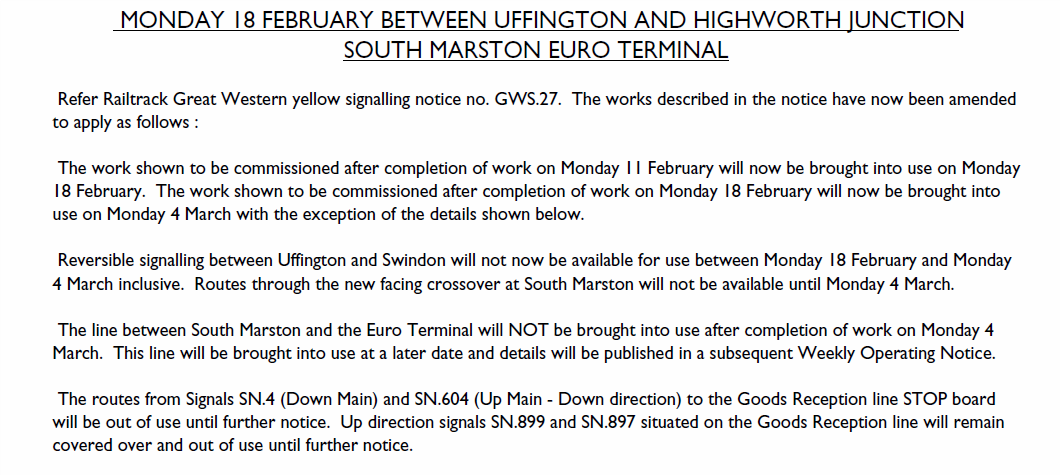South Marston
Overview
South Marston is a junction connection to 'Swindon Distribution Centre' (South Marston Euroterminal) between Highworth and Bourton.
Commissioning
It was planned to be commissioned on 7 and 14 February 2000, as described in GWS.15, but, due to 'construction difficulties' the work did not take place then.
As the point fittings had been installed (but not commissioned) in the 2000 work, controlled signals were needed to protect them. So UM.75 had been converted to controlled signal SN.81 and DM.73 had been converted to a controlled signal temporarily numbered SN.998, advertised by WON entry, shortly after the aborted 2000 work.
A second plan to commission the junction was planned for February 2002. As part of this 2002 scheme the points were brought into use.
The 2002 plan was broadly the same as the 2000 plan (apart from the signals and points described above).
A new signal was programmed for to the Goods Reception Line, SN.897, in rear of (and in addition to) the previously advertised SN.899. SN.897 is sited at the end of the Goods Reception, by the gates into the Euroterminal. It is back-to-back with a stop board for movements into the terminal. (The stop board is 44 SLUs (310 yards) from SN.899.) The stop board is fitted with a white light operated by the PiC in the terminal that authorises trains to proceed. The line rises towards the Euroterminal on a 1:250 gradient.
The new layout was planned to be brought into use on 11 and 18 January 2002.
and
but wasn't....
Panel Alterations
The panel was originally laid out without the South Marston infrastructure, and while altering individual tiles on an Integra panel is (relatively) easy, inserting extra length in the panel is not so easy.
Initially, all the Dominos between the Challow end of the panel and Bourton were moved up several spaces, so as to run along the second and third horizontal line of tiles in the panel. That then allowed the new South Marston layout Dominos to be added to the remaining 'end' of the Highworth part of the panel. This layout left a huge amount of blank space in the bottom left side of the panel.
This layout was found to be unsatisfactory and the Challow-Bourton tiles were subsequently moved back down in line with the rest of the panel, although slightly further left than they had previously been (onto the end of the new South Marston tiles). With the layout being condensed where Uffington Loops used to take up space (removed in the early 1990s), everything just about fitted in.
Interlocking
The first suggestion of there being an interlocking at South Marston was in the WON entry above when UM.75 and DM.73 were converted to SN.81 and SN.998 respectively.
Being a later addition than the other interlocking, a different format of controls was provided for the signalman, including separate alarms for earth faults and the intruder alarm on the relay room.
311 points, the crossover between the main lines is the only crossover on the Swindon Panel area to be fitted with split detection, enabling the signal on one line to be cleared even if detection is not available on the end on the 'other' line, provided the track circuit on the adjacent line is clear.
The following equipment belongs to South Marston Interlocking:
Controlled signals: SN.4, SN.604, SN.81, SN.899, SN.897, (SN.998, now removed).
As South Marston only has a facing crossover, there is a risk that a signalman could inadvertently route a train on the Up Main towards South Marston and a down train down the Up Main towards South Marston at the same time. Unless the down train is destined for the Euroterminal, this would mean the two trains arrived at South Marston and neither would have anywhere to go. Perfectly safe but hugely operationally inconvenient.
However, it would also not be desirable to remove this functionality, otherwise it would not be available during a failure of, say, 311 points when a train does require to access the Euroterminal.
To maintain the flexibility but control the risk, an 'are you sure' switch was provided in Swindon Panel which had to be operated to allow the opposing routes to clear.
Usage
The Euroterminal has not seen anywhere near the volume of rail traffic originally envisaged, there has never been any regular traffic and there can be many months or years between trains using the connection.








